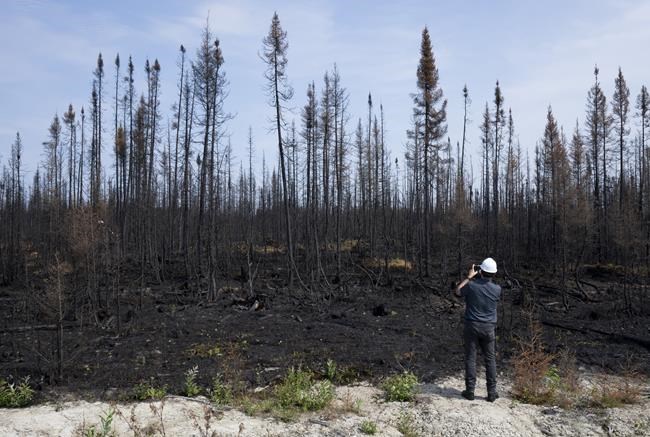Quebec's forest fire prevention agency says the area burned by wildfires this year was greater than the previous 20 years combined.
SOPFEU director general Éric Rousseau told reporters today that some 45,000 square kilometres of land burned during this year's record-breaking fire season, including more than 11,000 in the bottom half of the province, where most people live.
"This was a record for all time, never before reported in Quebec," he said. The previous record for the habitable zone was just under 3,900 square kilometres, in 2005.
Rousseau told reporters in Quebec City that a very dry spring meant fire indicators were near the maximum level in many parts of the province by May.
The province, which has the capacity to fight about 30 fires at time, was already overwhelmed by the end of that month. Then on June 1 came the coup de grâce, when a string of lightning storms across the province lit 182 fires in a single day.
In total, there were more than 700 fires across the province this year, and some 27,000 people from 27 communities were forced from their homes.
With wildfires raging across Canada, other provinces found themselves similarly overwhelmed, leaving them largely unable to lend the workers that Quebec could have otherwise depended on. Instead, the province received help from about 1,000 Canadian Armed Forces personnel as well as more than 1,100 foreign firefighters from the United States, France, Portugal, South Korea and Spain.
Rousseau said that while the province's resources were strained, there were no deaths and no primary residences or critical infrastructure were destroyed.
"Humbly, I think we can say 'mission accomplished,'" he told reporters in Quebec City.
Forest Minister Maïté Blanchette Vézina said the province is providing an additional $16 million to the fire prevention agency. She said the money will go toward the purchase of new equipment, such as vehicles and telecommunications material, as well as fire prevention initiatives and strategies to make communities more resilient to extreme weather events.
"The 2023 season left a scar on Quebec's forests," she said. "There will be a before the summer of 2023, and an after the summer of 2023."
She said "major reflections" were also underway as the province reviews its forest management practices and strategies to prevent fires.
Rousseau said the agency currently has a fleet of 14 water bomber planes, which is enough to protect the southern zone most years but can get spread too thin when fires simultaneously threaten communities and hydroelectric infrastructure in the more remote northern region.
He said about half of the planes are new, but some are older, and he's in discussions with the province about eventually replacing them.
This report by The Canadian Press was first published Nov. 14, 2023.
Caroline Plante, The Canadian Press



